In May 2016, Britain voted to leave the EU. The only reason David Cameron held a referendum was because he was convinced he would win. But, he hadn’t expected Boris Johnson to make a last minute switch and help galvanise a Vote Leave campaign.
The result was a shock and the Pound fell 13%, raising the cost of imported goods. And this was the start of economic turmoil, which would hit British households with higher prices.
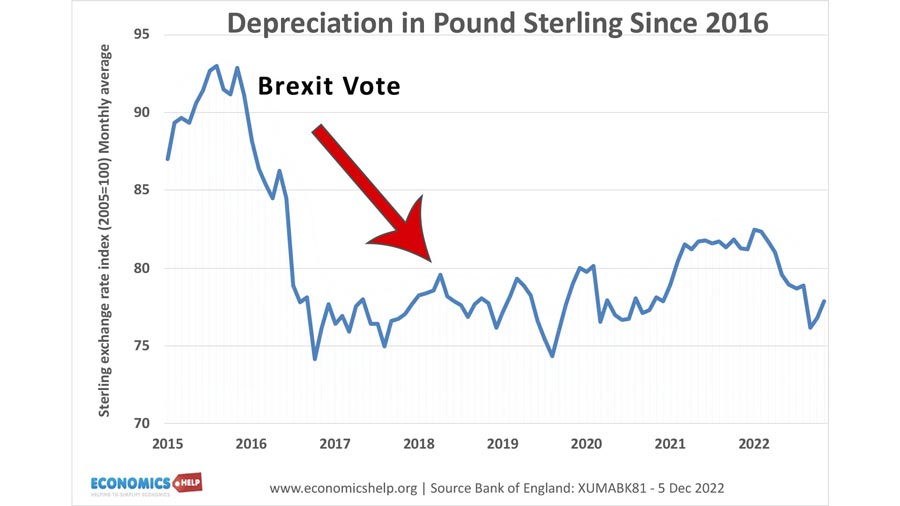
In the referendum, the campaign to leave had promised the best of both worlds – an end to free movement of labour, but all the benefits of the single market. However, Britain would spend the next five years slowly realising you couldn’t have your cake and it. Before the referendum, Michael Gove had claimed “The day after we vote to leave, we hold all the cards.” But, the day after winning, Gove and Johnson looked shocked as the enormity of the task began to shrink in. Faced with prospects of other countries wanting to follow suit. The EU were in no mood to give the UK a special deal and reward leaving. Ironically, whilst in the EU, the UK had succeeded in negotiating special deals. Opt out of Euro, Out of Schengen and a financial rebate on CAP, and exemptions on regulation of labour markets. One consequence of leaving is that all these special exemptions are probably gone forever.
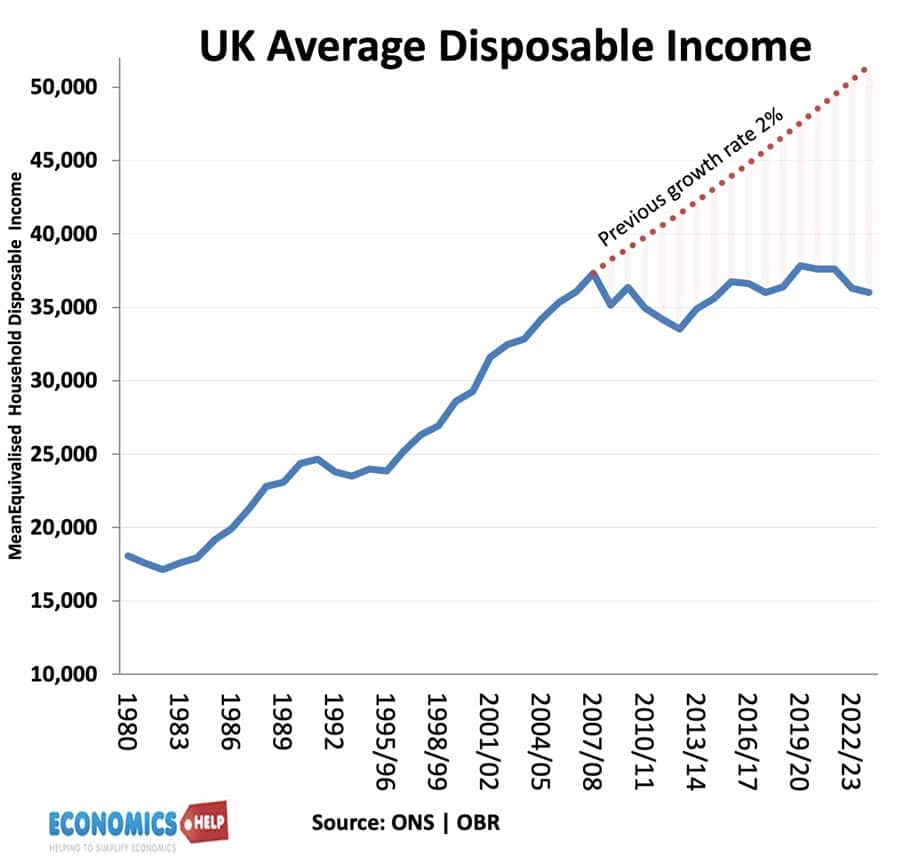
Take back control had been a powerful, evocative slogan for Vote Leave. It resonated with voters, who had seen a decade of stagnant wages and deteriorating public services. This was the back drop to the Brexit vote. The problem was that the UK struggled to get the deal it wanted. Parliament voted on many different types of Brexit, but they were all voted down. Nothing passed. Brexiteers wanted a harder Brexit, remainers wanted a 2nd referendum. The result was that the UK stumbled along to a deal which involved tariff barriers and customs duties. The combination of uncertainty, rising import prices and customs duties led to growing costs for the UK. Since 2016, Investment growth has fallen and studies suggest Brexit has reduced national incomes by between 2 and 10%.
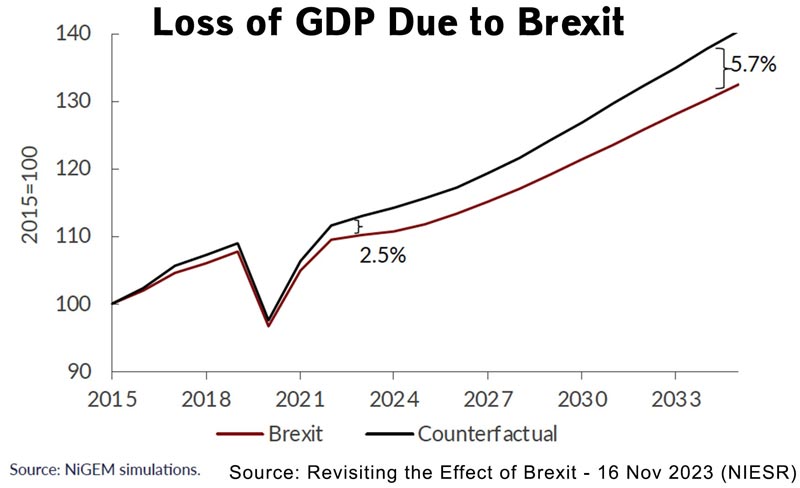
The consensus is a negative impact of around 4-5% off GDP. This may not sound a lot, but it means by 2030, the average household could be £2,500 worse off than if the UK had stayed in. It also means lower tax revenue for the government.
Economic Problems
The problem is that Brexit has happened at a time of weak economic growth and stagnant wages. The past 5 years have seen living standards fall for the first time in the post-war period. Brexit is not the only factor. The rise in gas prices, combined with a decade-long austerity has seen low growth across the European continent. But, it has magnified the negative impact of Brexit in the minds of voters.
As the Economist notes, after a referendum result, voters rarely change their mind, but usually become more supportive of the result. But, Brexit is an outlier, the % of people believing it to be a mistake has grown.
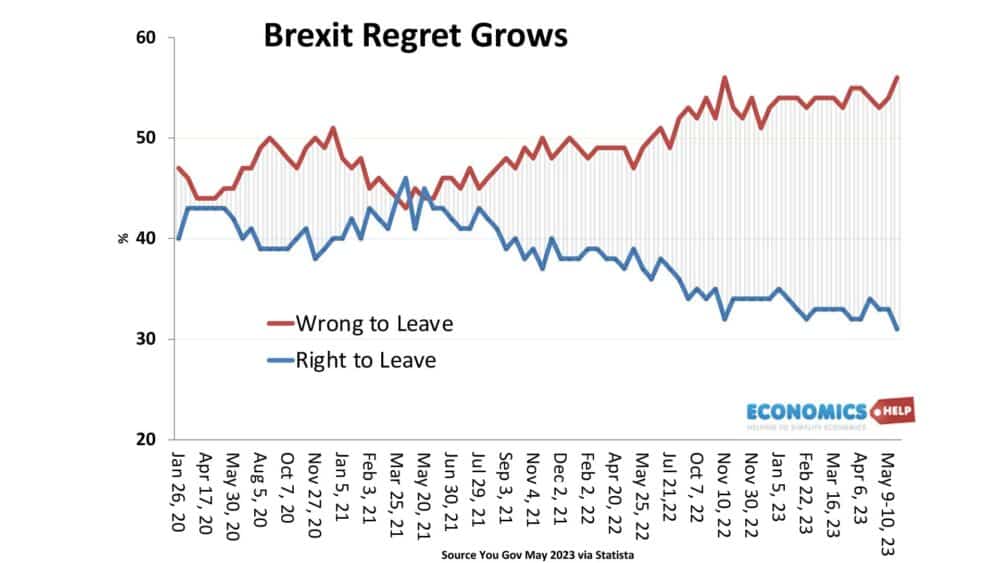
Only 32% of the population will now say they think that Brexit was the right thing to do. Dismayed by the downsides of Brexit and lack of any visible benefits. People have switched sides. Also, the vote for Brexit was overwhelmingly a vote by older people. Younger people wanted to maintain EU membership and freedom of movement. As time passes, older Brexit voters leave the electorate. This is one of the mistakes of Brexit the vote was made by people who would not live to see the consequences, but the younger generation who miss out on the potential of EU membership like working in the EU did not get to vote.
Costs to Come
The economic costs of Brexit are far from over. By staying outside the customs union, the trade deal means food imports have to be checked. This has still not been fully implemented as both sides are reluctant to actually implement the costly procedures. This is the irony of Brexit, a reluctance on both sides to implement it fully.
The government estimates that it will have to spend £4.7 billion on new measures for border security and physical checks. But, on top of that business and transport companies face a large increase in time wasted and cost of checks. Dover has seen epic tailbacks as lorries queue to be inspected. The costs of driving to the UK mean that firms have struggled to attract sufficient skilled workers and lorry drivers are in short-supply. When Europe suffered salad shortages, it was the UK who suffered the most because of lack of drivers.
The costs of the new Brexit rules have really hit small and medium sized firms, especially in the food and drink sector. A craft beer firm going bust is typical of how exports to Europe suddenly dried up. There customers said it was just too costly and time consuming to import from the UK. UK exports of goods to Europe have clearly fallen since the Brexit vote.
Farmers
A key voting block for Brexit was farmers, who disliked the Common Agricultural Policy, but outside Brexit, farmers are shocked to see how red tape has increased and their living standards have often declined. No wonder 83% of UK farmers say Brexit was worse than expected. Discontent with Brexit include the loss of subsidies, higher input costs and new free trade deals. In fact, one of the benefits of a hard Brexit outside the customs union is that it would leve the UK free to pursue free trade deals. An ideal for Brexit was a kind of Singapore on Thames, making the UK a low tax, free-trade utopia. The problem is that in return for trade deal, Australia and New Zealand wanted an end to agricultural protectionism. So outside the EU’s custom barriers, UK farmers now face more competition. Farmers are united in feeling trade deals are bad for business. In theory, British consumers can now get cheaper New Zealand butter and dairy products. But, this benefit has been lost on households, as they have seen prices rise 22% in 3 years. Although inflation was a global phenomena, it does seem to have been more acute in the UK, a reflection of dependence on gas, but also Brexit costs.
Free Movement
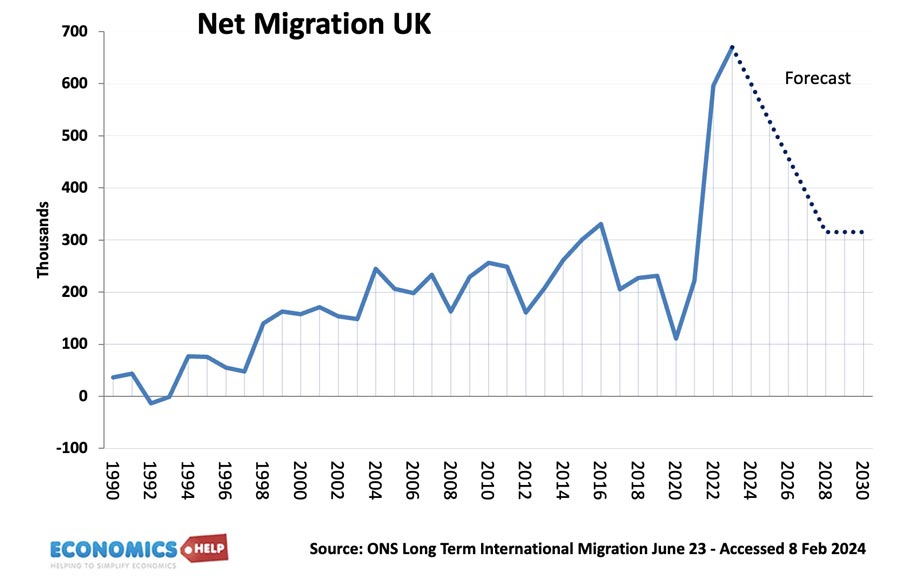
Another problem farmers face is attracting sufficient seasonal workers. Free movement from Europe was a key factor in UK agriculture. But, reducing immigration was a key part of the Brexit vote. But, unexpectedly, after Brexit the new immigration rules saw a surge in migration levels, to over double pre-referendum rates. It was also a different type of migration. European migrants were more likely to be young single workers coming for shorter time period. Post-Brexit migrants are more likely to be from further afield, Asia, Africa and as a consequence bring more family members. This has increased migration numbers but is also of lower economic value.
Net migration from the EEA area gave a higher net fiscal benefit than migration from outside the EEA. Since 2018, small-boat migration has soared, causing considerable political disquiet. Although there are many factors, a decline in co-operation between UK and France is cited as one reason for migrants being willing to take this option. When the UK was in the EU, there was a returns agreement. Illegal crossing could be returned to France. Outside the EU, this is not there.
One of the problems of Brexit was that once Vote Leave had won, there was a strong political force to seek an ever more purist Brexit. The deal the UK has is unlike anywhere else in Europe. Even Turkey is a member of the Customs Union. The logic was that the UK needed to assert its sovereignty and freedom. For example, the UK should pursue its own rules and regulations in all matters. There was once a plan to implement a unique UK safety mark. But, business protested saying it makes no sense to produce goods, which can only be sold in the UK. So the UK kept the CE safety mark of the EU, but now firms have to pay a certified EU body and have no input in the formulation of rules. It’s an example of how Brexit sovereignty doesn’t mean much for business.
Changing Political Landscape
When the Brexit vote happened in 2016, free trade was still relatively popular. Very few economists supported Brexit, but the likes of Patrick Minford claimed that if the UK lost trade with Europe, no harm, the UK could trade more with China, India, Russia and Asia. But, the world has changed since 2016, and the Ukraine War has made businesses want to bring production closer to home. The US is leading the way with ever-higher tariff barriers. The once hoped for US free trade deal is now dead in the water. It turns out that your close geographical neighbours are very important.
Brexit also created complexities for Northern Ireland. A hard border threatened to undermine the efforts of recent decades to bring closer co-operation between UK and Ireland. Brexit has made the idea of united Ireland more attractive to some. Brexit also heightened tensions between Scotland and the UK. Scotland voted to remain. And the push for a hard Brexit only strengthened independence sentiment. It would be ironic if UKIP – a significant force behind Brexit accelerated the break up of the UK.
Brexit was a bold experiment, but it has proved unpopular with the British people. The one interesting effect is that it made shored up support for the EU oon the continent and Eurosceptic movements fell from favour.
Related
